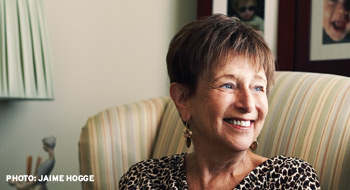
For more than 10 years, Karen Liberman was crippled by a clinical depression so severe that she would sometimes spend 24 hours crying. “I was barely surviving it, yet I continued to work the whole time I was desperately ill,” she recalls.
In the summer of 1997, Liberman was hospitalized by her psychiatrist for 48 hours because of suicidal thoughts. During her stay, she began participating in a clinical trial for a new medication that snapped her out of the depression in one day. “It was an unusual experience and either a gift of modern medicine or a miracle—or both,” she says. A week later, she knew her life’s focus had to be helping others.
Within six months, Liberman was speaking at conferences for the Mood Disorders Association of Ontario (MDAO). “A year after my recovery, the association asked me to join the board of directors and then, the following year, to be the president,” she says. In January 2001, she stepped into the role of executive director. “It was as if I had been on this long and very convoluted journey to come home to this exact place.” During this period, her marriage of 32 years ended, and she began talking to her kids about her disease instead of trying to hide it from them.
Throughout her almost 15-year career with the MDAO, Liberman spearheaded many projects aimed at helping those who struggle with mental illness and reducing the stigma associated with it. While struggling with her own depression, Liberman continued to work as a policy analyst at a non-governmental think tank. She believes the experience gave her a unique perspective that shaped her contributions. “While suffering, I was ashamed, and I kept my illness a secret as much as possible,” she remembers. “I did not ask for support. I learned that not acknowledging my illness left me isolated; it also meant my co-workers could not address the issue, which created resentment.”
Liberman believes there are thousands of workers affected by mental illness who are trying to hide it. “People are afraid to talk because they don’t have the skills or the language.” To help break the silence, she and her team launched Check Up from the Neck Up, an awareness campaign and online screening tool for depression, bipolar disorder and general anxiety that has helped to normalize the idea of monitoring your own mental health. “At the time, it was completely revolutionary,” she says. The tool () goes beyond assessment to provide practical feedback, such as what to ask your doctor.
Liberman is also particularly proud of Changing Minds at Work, a series of presentations and workshops for companies to educate managers, employees and employers about mental illness. “We had a real role to play in moving the mental health agenda in Canada beyond ‘We’re losing money’ to ‘How do we begin to address this?’” she says.
The MDAO is launching another program in October, which Liberman views as her true legacy project. It’s called Mental Health Map, a free confidential online recovery program. “It’s highly interactive and gives people control over their treatment,” she explains. The program provides access to three coaches who work with the individual to create a personalized action plan. “So much of these illnesses is about helplessness and a loss of control. Part of recovery is to break through that and start doing things.”
Liberman retired from the MDAO this past June but plans to remain an advocate for mental health issues. And she hopes that her contributions to the conversation in Canada will keep pushing the mental health agenda forward. “The time for asking if mental health is worthy of attention has passed.”
Leigh Doyle is a freelance writer based in Toronto. leigh.doyle@gmail.com
Get a PDF of this article.
